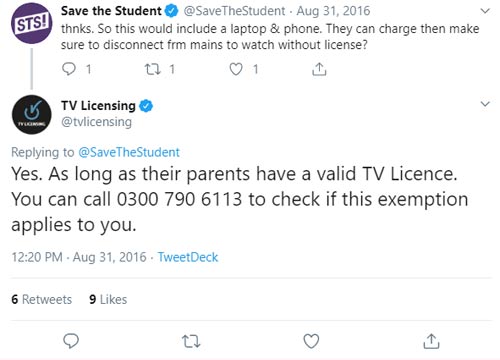TV Licensing uni loophole: Students don’t need a licence to watch BBC iPlayer
Despite changes in the law to ensure you need a TV Licence to watch BBC iPlayer, the majority of students won't have to pay at uni – thanks to this technicality.

Credit (right): Bodnar Taras - Shutterstock
NOTE: We originally discovered this loophole back in 2016, but we've checked and it's still valid!
We've discovered a loophole that suggests students might not need to pay for a TV Licence.
Originally the BBC announced that changes would be made to the licensing law in January 2017. This move would force anyone who downloaded or streamed on-demand TV from BBC iPlayer to pay for a TV Licence.
Back then, we reported that the deadline for the changes to be enforced was suddenly brought forward to 1st September 2016. Unluckily, this coincided with students going back to university. And the ruling is still in force today.
TV Licensing has also made it quite clear that students play a big part in their decision to enforce the changes.
They stated in their press release:
Research by TV Licensing has revealed iPlayer is the most popular catch-up platform used by students, ahead of sites such as YouTube and services including Netflix.
However, as we soon discovered, there was a loophole to ensure a get-out-of-jail-free card for the exact group of people TV Licensing were looking to target: students.
Student TV Licence loophole

The loophole, which is even featured in the official press release on the TV Licensing website, states that:
In limited circumstances, students can be covered by the licence at their parents' address. The device must be powered by its own internal batteries – e.g. a tablet or mobile phone – and must not be plugged it into the mains when receiving television. This use is enabled by the regulations governing TV Licensing.
We've tried to do some digging to establish what the "limited circumstances" are that they speak of, but this appears just to be an attempt at a deterrent.
On another page of the TV Licensing website, we found a similarly strange message:
Your parents' TV Licence won't usually cover you while you're away at university. [...]
However, if your out-of-term address has a TV Licence (for example, your parents' or guardian's home) this will cover you, provided you're only watching on a device that's powered solely by its own internal batteries (like your mobile phone, laptop or tablet) AND it isn’t connected to an aerial or plugged into the mains.
So, essentially, as long as you can answer 'yes' to all of the following, students can watch iPlayer (or any form of live TV) without a TV Licence:
- You're watching on a device that is functioning on its own battery power, without being plugged into the mains (e.g. a laptop or phone)
- Your parents have a TV Licence
- Your parents' home address is your main address (i.e. it's where you live when you're not living at uni).
What TV Licensing says about student TV Licences
We reached out to TV Licensing about the loophole on X (formerly Twitter), and here's what they said:
And just to clarify – students have always been able to watch TV on an unplugged device under their parents' TV Licence.
However, what we're keen to make clear is that the iPlayer changes to the TV Licensing agreement, bizarrely, have no effect on this rule.
And if you have any doubts about whether you're covered, please call 0300 790 6113 to check with TV Licensing directly.
The student TV Licence loophole is just one of our top tips for watching football on TV for less.









